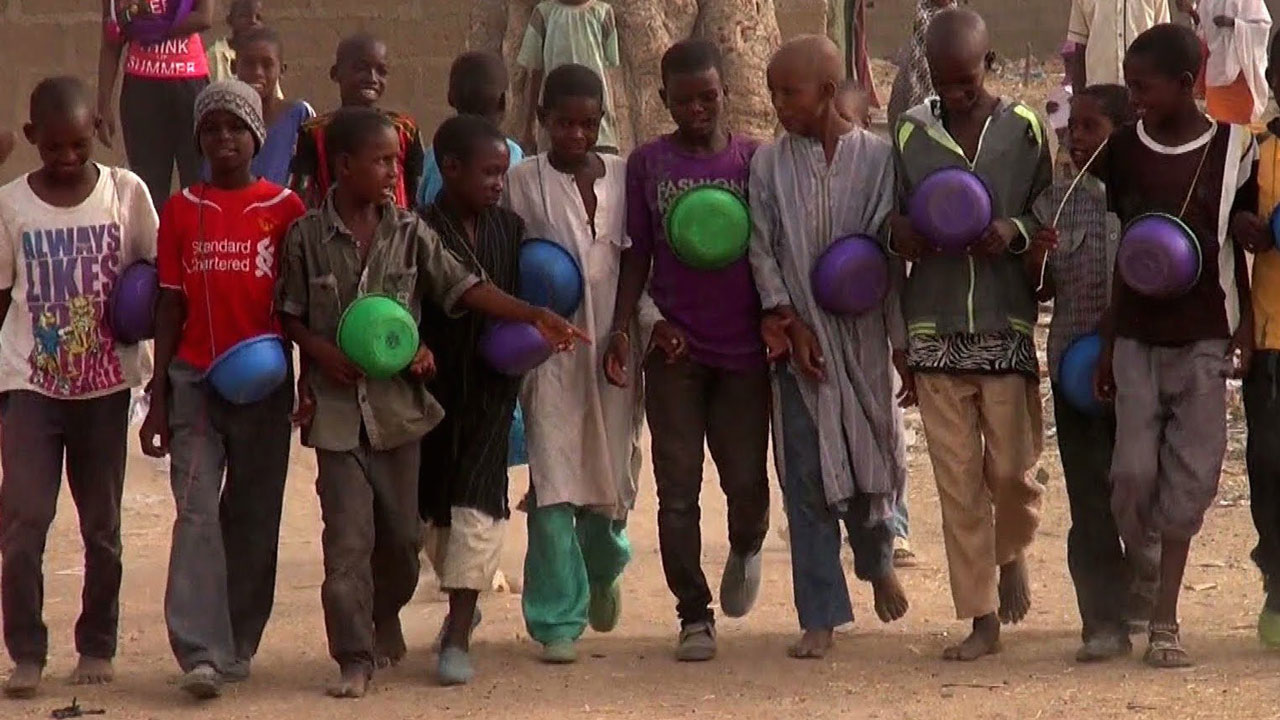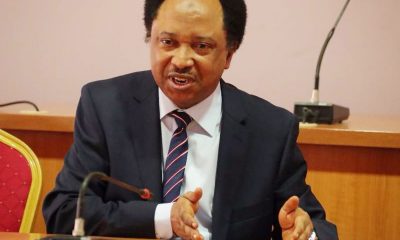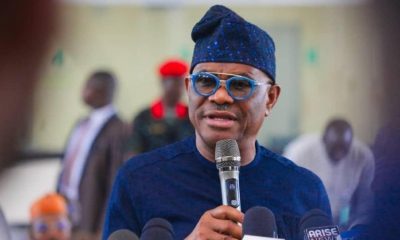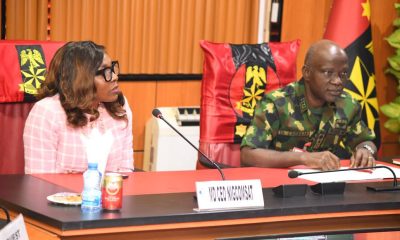Education
Nigeria’s out-of-school children quagmire
Published
3 years agoon
By
Publisher
By Emmanuel Onwubiko
“The man who does not read has no advantage over the man who cannot read.
~Mark Twain
“Once you learn to read, you will be forever free.
~Frederick Douglass
Ndianiche Uwakonye, is a village setting in Arondizuogu located in Onuimo local government council of Imo State.
This community has just one school as primary educational facility for hundreds of children who are enrolled. Many more whose Parents have no resources to procure uniforms and writing materials for them are roaming about in the village wasting their childhood in unproductive plays.
These structures in that Uwakonye Aniche, two in number, which make up the community primary school can at best be described as not suitable for human habitation. Most times the school is overgrown by weeds as there are no non academic staff to take care of such activities of cutting the bush to enable the children learn in a good environment.
The aforementioned school with vast landed assets was built through communal self help effort but along the line, the community handed over the school to the Imo State government and ever since this transition, the place has become like a jungle.
Yet, daily, hundreds of kids go to that school just as the number of teachers working on full time basis are so few. I can’t personally vouch for the qualifications of the few teachers in that school where hundreds of our children are educated.
This appealing poor standards of facilities at this Uwakonye primary school in Arondizuogu Imo State, is replicated in virtually two third of the rural schools in Nigeria due to neglects by the governments. Ironically, primary schools in the Federal Capital Territory are not that great and different from the poorly maintained and poorly funded primary schools in the rural communities.
This criminal neglect and outright corruption on the part of government officials paid to run the education ministry, are in place despite the fact that the Nigerian constitution recognises that free primary to early secondary school education is compulsory and free.
Besides, Nigeria also has an agency known as the Universal Basic Education Commission but yet this commission has failed spectacularly to offer the needed intervention towards delivering quality education to our kids especially in the rural schools.
That said, it is a universal fact to state that one of the biggest and seemingly intractable developmental challenges of Nigeria remains the growing rates of out of school kids of Nigerian origin.
The corollary to this debilitating social quagmire is the unprecedented spread of poverty afflicting the greater numbers of Nigerian families which gives rise to the high number of school kids. This is because, getting the populace educated qualitatively guarantees a higher quality of living conditions.
Another reality that correlates with the menace of out of school children in Nigeria is the poor quality of school facilities and the shortage of qualified teachers to teach young Nigerian children in the hundreds of thousands of schools erected in many rural settings just as aforementioned with the Arondizuogu scenario.
The combine effects of not having all of the children of school age in schools in Nigeria and the dehumanizing standards and poor qualities of schools in Nigeria and abundance of poorly trained and remunerated teachers is that Nigeria will continue to see millions of her citizens turning out as adults without faintest credentials from any organized formal educational platforms.
These two issues aforementioned about early childhood education in Nigeria promote backwardness, lack of creative talents to solve intractable economic, scientific and daily life problems that are capable of derailing sustainable growth and development in Nigeria.
Poor teaching and appalling standards of schools in Nigeria sure has become a major disincentive to enrollment into formal school system by so many of our kids.
We will return to see what the United Nations is saying on the virus of out of school kids in Nigeria – The impacts is so negative of which are worst than that of the affliction of Covid-19 virus.
But first, let us analyze the frightening figures of illiterates in Nigeria of today.
A trending report has it that with 65 million Nigerians illiterate, it is time for government, schools and individuals to take action.
UNESCO’s National Programme Advisor on Education, Dr Mohammed Alkali recently revealed the results of a UNESCO survey that showed that despite improvements to the country’s education system, 65 million Nigerians remain illiterate.
This statistic is alarming for a number of reasons. Illiteracy has adverse impacts at both an individual and societal level. People who are illiterate are far more likely to live in poverty, facing a lifetime marred by poor health and social vulnerability. Economically, the impacts of illiteracy are also sizeable; workplace productivity, unemployment rates and even national GDP are all affected by a country’s literacy levels.
With Nigeria’s illiteracy rate standing at just over 50 percent, experts say it is a matter of national urgency that Nigerians work to redress our literacy crisis. How can we make real changes that have a measureable and tangible impact on Nigerian learners, asks an analyst?
The analyst concludes that Of course, governments and policy makers need to play a critical role in any solution. Illiteracy will never be overcome while 10 million Nigerian children remain out of school. Providing quality schools and quality teachers are therefore a vital component in improving national literacy levels.
For these analyst, equipping schools with the necessary resources – libraries, books and classroom facilities – and providing adequate training for teachers, rightly, are all essential to making literacy widely available to all Nigerians. However, access to classrooms and books is only part of the answer. As parents and citizens we all have a responsibility to promote literacy amongst our young people.
But with 35 million Nigerian adults illiterate, how do we instil a love of reading in our children when so many of us can’t read ourselves? Children of illiterate parents are far more likely to be illiterate themselves, therefore education programmes that target adults as well as school children are key.
The reporter quickly stated that we also need to be better at making parents throughout the country aware of the critical importance learning and education play in their children’s future.
This is because, a child who can read and write sufficiently will enjoy better employment prospects, better earning capacity, better access to healthcare and be less likely to face social exclusion.
Reducing illiteracy, the analyst as well as this writer believe, should therefore be viewed as an investment, rather than a cost, for both the governments and households, pundits reasoned.
Relatedly, Nigeria now has about 20 million out-of-school children, according to the latest global data on out-of-school children by the United Nations Educational, Scientific and Cultural Organisation (UNESCO).
UNESCO, which says a new and improved methodology was used to arrive at the latest figures, said there are “244 million children and youth between the ages of 6 and 18 worldwide (who) are still out of school.”
According to the statistics, India, Nigeria and Pakistan have the highest figures for out-of-school children globally.
The figures in Nigeria have oscillated between 10.5 million and around 15 million for more than a decade, with the situation growing worse due to the degenerating security situation in the country.
UNESCO announced the figures in a statement issued on Thursday, a copy of which was made available to PREMIUM TIMES by Dafalia Dimitra, a media specialist, with the Global Education Monitoring Report (GEM), which is developed by an independent team and published by UNESCO.
The global organisation said the team developing the report “has the official mandate of monitoring progress in meeting the Sustainable Development Goal on education, SDG 4.”
The statement read in part: “The new estimates, published online by the UNESCO Institute for Statistics (UIS) and the Global Education Monitoring (GEM) Report, show that sub-Saharan Africa remains the region with the most children and youth out of school with 98 million children and young people excluded from education. It is also the only region where this number is increasing; out-of-school rates are falling more slowly than the rate at which the school-age population is growing.
“The region with the second highest out-of-school population is Central and Southern Asia with 85 million. The top three countries with the most children and youth excluded from education are India, Nigeria and Pakistan.”
According to the Director of the UNESCO Institute for Statistics, Silvia Montoya, efficient use of the available data is important to address the gaps towards achieving the fourth goal of the SDGs.
“UNESCO has long underscored the need to make more efficient use of the data we have. That’s why we’ve brought together administrative data with information from surveys and censuses. By using multiple data sources, gaps are filled, data trends are smoothed, and we can draw consistent time series,” the official said.
UNESCO said important data gaps have been filled in countries with large out-of-school numbers “but where no administrative data of good quality has been available for over a decade.” It listed the countries in this category to include Nigeria “which has an estimated 20 million children and youth out of school, Ethiopia (10.5 million), the Democratic Republic of Congo (5.9 million) and Kenya (1.8 million).”
Factually accurate as the above scientific details are, the fact is that Nigeria has different levels made efforts to bridge these gaps educationally. But poor implementation has been the bane of most of these programmes that ought to work as quick win interventions to check this deterioration in the quality of education and reduce the numbers of out of school kids.
For instance in 1999, the Nigerian government introduced Universal Basic Education, a programme to provide free primary and secondary education for all.
This programme was reportedly initiated after several unsuccessful attempts at improving education in the country.
Unfortunately, although there has been some improvements in enrolment in recent years, its results have been limited and Nigeria’s educational system still rates very poorly in most international rankings.
The initiative is under the UBE programme only took off effectively with the signing of the UBE Act in April 2004.
The main beneficiaries of the programme are: Children aged 3-5 years, for Early Children Care and Development Education (ECCDE);
Children aged 6-11+ years for primary school education;
Children aged 12-14+ years for junior secondary school education.[6]
Its scope included the following expansion of activities in basic education.
However, report has it that School enrolment was still low at the beginning of 1990s – as of 1990, gross enrolment ratio in primary school was at 86%, but it had dropped to a mere 25% by the time children reached secondary school.
Also, experts reckon that as of 2015, Nigeria ranked 103 out of 118 countries in UNESCO’s Education for All (EFA) Development Index, which takes into account universal primary education, adult literacy, quality of education, and gender parity.
UNESCO’s 2015 review of education in Nigeria found that enrolment at primary and junior secondary levels had greatly increased since 2000. However, transition and completion rates remained below 70%.
Enrolment rates reportedly increased by 130% for secondary education in the period from 2000 to 2013 (based on the latest available statistics from the World Bank), but decreased by 4% for primary level.
Media report said that in its latest review of Nigeria’s educational standing in 2015, UNESCO has concluded that although progress has been made in basic education, much more remains to be done, both in quantity and quality:
Participation in primary education is still low in comparison with primary school age population;
The quality of the national school curriculum is undermined by the generally low quality of teachers who implement it, which translates into low levels of learning achievement;
Infrastructure, toilets and furniture are inadequate and in a dilapidated state;
The system of collecting comprehensive, relevant data for planning is weak;
There are social and cultural barriers that are hindering female participation;
There is a lack of enforcement of the UBE Act 2004 on enrolment and retention.[11]
Stakeholder engagement
The main stakeholders involved in the Nigerian education policy were the federal government, state governments, as well as some international institutions that have provided support over the years.
However, although there is a clear responsibility and involvement of state actors in terms of implementation and funding, there is no evidence of communication or consultations between institutions at the federal and state level in the design of the UBE programme, which led to misalignment later in the implementation phase. This is so true and the earlier this yawning gap is filled the better for the educational wellbeing of Nigerians.
Recall too that UNESCO mentions, for example, that insufficient consultation with the states in designing and implementing the UBE programme, including project selection, has been one of the main causes of problems in the funding allocations in the years since its launch.
Political commitment
The Government of Nigeria has made recurrent attempts to reform its education system since the 1970s, but has lacked the alignment and political continuity to implement its programmes successfully, as discovered by a researcher quoted above.
Shocking as these negative educational ratings of Nigeria is, we are now in a period whereby we can collectively reshape the prospects and future of education for all Nigerians.
This is the campaign season which will ultimately usher in a new set of political leaders by May 29th 2023 if the early February election go on successfully as envisaged.
This is the time to demand from aspirants campaigning to be voted for by the voters, to tell Nigerians what agenda for the advancement of education that they have captured into their manifesto.
Not so much is said in the manifestos of majority of these politicians currently campaigning in Nigeria regarding what they will so the bridge the educational gaps aside the Presidential candidate of Labour party Mr. Peter Obi who has articulated a workable framework on delivering quakity education for all if he wins. Bola Ahmed Tinubu who claims to be a University graduate has avoided public debates like a plague just as he hasn’t told Nigerians where exactly he underwent primary school education. Tinubu’s educational credentials are marred in unnecessary controversy as this information remains a top secret.
Luckily, 14 out of the 18 persons jostling to be Nigeria’s president are university graduates, the final list of candidates released by the Independent National Electoral Commission (INEC) has shown.
One has an Ordinary National Diploma. The list also indicate that the presidential candidates of the Peoples Democratic Party (PDP), Atiku Abubakar, and his All Progressives Congress (APC), Bola Tinubu, are the oldest among the 18 candidates in the election.
INEC in its final list published recently, cleared a total of 36 presidential and vice presidential candidates from all the 18 recognised political parties to contest the 25 February election.
INEC headed by Professor Yakubu Mahmoud also approved 1,101 candidates for the 109 senatorial seats and 3,122 for the 360 seats in the House of Representatives.
The release of the list officially closed the constitutional window for any party to replace either its presidential or running mate unless any candidate died or there is a court order.
However, in the final list published, a media reporter said that Mr Abdulmalik, indicated that he has a Bachelor of Science (B.Sc) in Economics.
He is one of the 22 presidential and VP candidates with either B.Sc, B.Arts, Bachelor of Law and a degree in engineering from different universities in Nigeria and abroad just as Messrs Tinubu, Obi, others are first degree holders.
Apart from Mr Abdulmalik of YPP, Mr Tinubu, Peter Obi of Labour Party (LP), Umeadi Chukwudi of APGA, Sani Yabagi of Action Democratic Party (ADP), Imumolen Christopher of Accord (A), and Nwanyanwu Daberechukwu of Zenith Labour Party (ZLP) are the other presidential candidates that submitted bachelor degrees as their highest qualification.
The Social Democratic Party (SDP), Adebayo Ebenezer, holds a Bachelor of Law degree.
Hamza Al-Mustapha Hamza, the presidential candidate of the Action Alliance (AA), has an Ordinary National Diplomai.
Atiku, Sowore, Abiola, others submit masters as highest degree even as Five candidates among the 18 persons have masters degrees.
Omoyele Sowore of African Congress (AAC), Kola Abiola of PRP, Adenuga Oluwafemi of Boot Party (BP), Osakwe Johnson of NRM and Atiku are the only candidates with masters degrees.
The former Kano State Governor, Rabiu Kwankwaso of the New Nigeria Peoples Party (NNPP), is the only candidate with a Ph.D.
Others who hold Ph.D are the NNPP running mate, Isaac Idahosa, and his LP candidate, Datti Baba-Ahmed.
Only the presidential candidate of the Action People’s Party (APP), Nnadi Osita, and his counterparts in African Democratic Congress (ADC), Dumebi Kachikwu, and Ojei Chichi of Allied Peoples Movement (APM), the only female candidate in the race, submitted SSCE and WASC as their highest academic qualifications to INEC.
Mrs Ojei submitted her secondary school certificate obtained from American International School in Switzerland.
The other candidates in the race with only SSCE are the vice presidential candidates of National Rescue Movement (NRM), Action Alliance (AA), People’s Redemption Party (PRP) and ADC.
It is one thing to parade certificates but another important leadership quality is to be able to put into good use, top level educational policy that will lift Nigerians to their better selves and end the perennial out of school menace which is now a hydraheaded monster.
- Onwubiko is head of the Human Rights Writers Association of Nigeria and was National Commissioner of the National Human Rights Commission of Nigeria.
You may like


US announces withdrawal from UNESCO, Citing Anti-Israel bias and ‘Divisive’ agenda


FG commits to generating $100 billion from Nigeria’s creative economy


Shehu Sani incurs anger of Nigerians over suspension of protest, dialogue


How hired anti-protest thugs repented, joined hardship protest in FCT


Abuja youths overwhelm Wike, as Minister accuses Senator of sponsoring protest in FCT


Nigerian Army partners NIGCOMSAT to expand frontiers of communication, boost military operations
Trending

 Health1 week ago
Health1 week agoRacketeering allegations trail claims of vaccine profit cycle

 Business1 week ago
Business1 week agoNaira gains against Euro as strong reserves, trade surplus bolster currency outlook

 Health7 days ago
Health7 days agoSinger’s death sparks doctor’s takedown of snakebite myths, exposes public health gaps

 Latest1 week ago
Latest1 week agoPDP leadership crisis deepens as Turaki-led NWC faults INEC over meeting with Wike-aligned faction

 Latest1 week ago
Latest1 week agoAPC reshuffles convention committee, drops Uzodinma as Chairman, appoints Masari

 Football7 days ago
Football7 days agoBarcelona moves to secure Rashford permanently, target Romero

 Education5 days ago
Education5 days agoOgun students call for increased funding to improve tertiary institutions

 Crime7 days ago
Crime7 days agoGunmen kill Anambra community leader in suspected cult revenge attack

